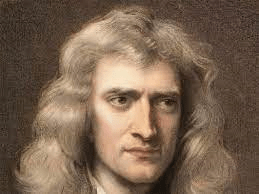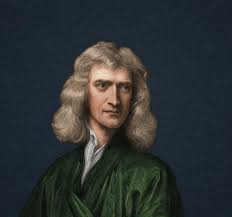Isaac Newton - Biography
Isaac Newton

Sir Isaac Newton was an English physicist, astronomer, theologian, mathematician, and author who embodied the 17th-century Scientific Revolution. Newton is most known for his theory of gravity, but his "Principia Mathematica" (1686), which included the three principles of motion, significantly impacted the European Enlightenment. While on leave from the University of Cambridge, he began working on light, mathematics, and celestial mechanics theories. Years of research culminated in the publication of Newton's "Principia," a seminal work that defined the universal equations of motion and gravitation in 1687.
Newton was president of the Royal Society of London and master of the Royal Mint of England until he died in 1727 and was a student of biblical history and alchemy.
Isaac Newton Education:
On December 25, 1642, Newton was born in Woolsthorpe, Lancashire, England. His father passed away only three months before he was born. Because of the loss of his father's shadow as a child, he had many problems. His mother remarried when he was three years old, leaving him to be raised by his grandmother and moving in with the new husband. Newton had little fondness for his stepfather. When Newton was a child, he could not talk clearly for some days. He was accepted to The King's School, Grantham when newton was seventeen. On the other hand, he did not learn mathematics there, so it did not fill his thoughts with academics.
Newton's mind was always fascinated with numbers. Since boyhood, he has been fascinated by celestial bodies and planets, and was astounded to witness the sun's rays. In October 1659, Newton was expelled from the academy. His mother's second spouse had likewise died in this town.
That is why their mother requested them to look after the farm. However, she did not focus on Newton's intellect in agriculture. The principal of The King's School, Henry Stokes, urged Newton's mother to re-enrol Newton in the school so that he could continue his education. Newton was not discouraged that time, and quickly rose to the school's top student position. From twelve to seventeen, he attended King's School in Grantham.
He studied at King's School in Grantham before entering Trinity College, University of Cambridge, in 1661, after an unsuccessful effort to become a farmer.
Newton took a classical education at Cambridge but was enthralled by the works of modern philosophers such as René Descartes, dedicating a set of notes, the "Questions Quadum Philosophic," to his superficial reading.
Newton went home when the Great Plague closed Cambridge in 1665 and set out for Calculus, Light and Color, and his Falling Apples, which inspired his study on gravity and allowed him to formulate his ideas.
Isaac Newton was chosen for a fellowship at Trinity College once the university reopened in 1667. Two years later, Isaac Barrow, the Lucasian professor of mathematics who had sent Newton's De analysis to John Collins in London, resigned from his position to pursue divinity and nominated Newton as his replacement.
Newton's Laws of Motion:
The first law of Newton
According to Newton, if an item is at rest or going at the same speed, it will only change its condition when an external force is applied. Newton's first law states that if no external force is applied to an object, it will remain in its current state.
The second law of Newton
Newton's second law says that an object's rate of change of momentum is directly proportional to the force applied to it and that the change of momentum always occurs in the same direction as the force is applied. The law of change of momentum is another name for it.
Third law of Newton
Newton's third principle is the law of action-reaction. Action and reaction are always in opposing directions, but the force working on both sides in action and reaction is always the same.
Interesting facts about Isaac Newton:

- Galileo died on January 8, the same year Isaac Newton was born, in 1642.
- Newton's size was substantially less than average at his birth. Hence there was little chance of him surviving.
- Newton's mother wished for him to become a farmer when he grew up. He attempted but failed the agriculture exam.
- The plague was common at the University of Cambridge when Isaac Newton developed the law of gravitation, three laws of motion, and calculus.
- At the age of 23, Isaac Newton discovered the force of gravity.
- Newton's head is alleged to have been hit by an apple. The apple landed in front of him rather than on his head.
- Most of Isaac Newton's study papers and books deal with history and religion rather than science and mathematics.
- Following the loss of his mother, Isaac Newton went into a six-year mental coma, speaking exclusively via writing.
- For one year, Isaac Newton was a member of Parliament. He just said one sentence in the entire year: he asked his side to close the open window.
- To explain why all the planets circle ellipses, Newton invented differential and integral calculus.
- Isaac Newton is thought to have died a virgin since he was never married.
- Isaac Newton, who was 85 years old, died in London, England, on March 31, 1727.
- The calculation was a minor error in Isaac Newton's mathematical theory, yet it went unnoticed for 300 years. This error was discovered in 1987 by Robert Garisto, a University of Chicago student.
- A chunk of wood from the tree that the apple fell from was also sent into space. This tree has a sense of 'zero gravity; therefore, it can ignore gravity.
Personal life and legacy:
Newton's personal life was far from ideal, despite his near-perfect work life. He struggled with insecurities, pride, and perhaps mental instability. Newton spent his later years in Cranbury Park in Winchester, England, with his niece and with her husband.
Due to his scientific achievements and personal wealth, he acquired a huge following. After suffering from acute abdominal pain, Newton died peacefully in his sleep on March 31, 1727. Aristotle, Plato, and Galileo were all compared to him.
To the north of the entry to Westminster Abbey, there is a memorial to Newton called Newton's Monument. It also honors the renowned scientist's achievements and pays tribute to his pioneering discoveries. A picture of Newton appeared on the Bank of England's Series D'1 banknotes for over a decade, from 1978 to 1988. He was holding a book, a telescope, a prism, and a map of the Solar System in the image. A statue of Isaac Newton stands at the Oxford University Museum of Natural History, looking at an apple at his feet. In addition, a massive bronze statue of Newton stands in the piazza of The British Library in London.
It is stated that an apple falling from a tree motivated this great scientist to figure out what was causing the activity, which led to the discovery of gravity. He wrote Philosophe Naturalis Mathematica, widely recognized as one of the most important works in scientific history. He explained universal gravity and the three laws of motion in it.
Study on Telescope and Light:
In 1667, Newton returned to Cambridge and was appointed a junior fellow. In 1668, he completed his Master of Arts degree and developed the first reflecting telescope. He was elected to the Royal Society of London the next year after demonstrating his telescope to the Royal Society of London in 1671.
Newton discovered that white light is a combination of all the hues in the rainbow and that light is made up of particles rather than waves through his refraction studies. Newton, known for his passionate defence of his work, got into an argument with Robert Hooke in 1678 before having a nervous collapse and withdrawing from public view. Later in life, he returned to his prior studies of gravity's forces and dabbled in alchemy.
Gravity's Law
Edmund Halley, an English astronomer, paid a solo visit to Newton in 1684. Halley persuaded Newton to organize his notes after learning that he had mathematically modelled the elliptical motions of celestial bodies. Following the publication of "Philosophie Naturalis Principia Mathematica" in 1687, formulated the three laws of motion and the law of universal gravitation. Newton took over as president of the Royal Society after Hooke died in 1703, and the following year he produced his second major work, "Optics." The book is mostly made up of Newton's earlier notes on the subject, chronicles Newton's arduous studies with refraction and the color spectrum, and ends with his ruminations on topics like energy. Queen Anne of England knighted him in 1705.
Death of Isaac Newton:
Isaac Newton died at Kensington, Middlesex, Germany, on March 31, 1727, and was buried in Westminster Abbey. His relatives took over Newton's assets because he had no children. A high amount of mercury was discovered in Newton's body after his death, most likely due to his chemical experiments. Newton's monument is built above his tomb, and his statue is constructed of stone, sculpted by Michael Ridgebrach in white and grey marble, and designed by architect William Kent. According to his monument, his right elbow is on many great books, and his left hand is pointing to a mathematical list.
Newton had the greatest genius, according to Joseph Louis Lagrange, a French mathematician, and Newton was also the greatest of luck, according to Joseph Louis Lagrange. Alexander Pope, an English poet, was inspired by Newton's accomplishments and wrote a book about newton.